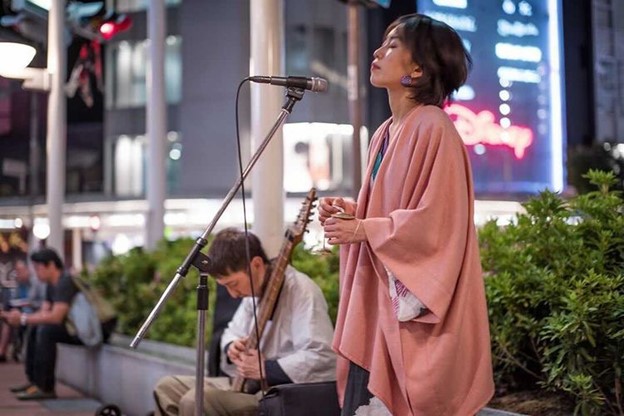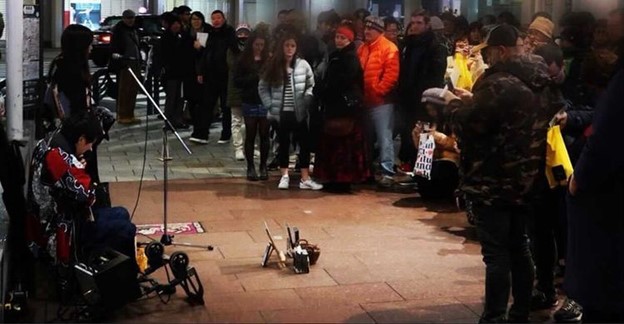



Nader Sammouri
OSAKA: While humanity gently weeps with its latest challenges, music heals.
Upon walking in Kyoto, one’s ears may stumble upon charming sounds in the streets and may wonder about the source of this soul-penetrating soprano greeting a guitar-like sound.
Tracking it, one encounters a Japanese woman and man elegantly wearing their traditional Japanese robes, eyes closed and seemingly centered while they perform magnetic sounds.

Lured towards the awe-inducing musicians, passers find themselves captivated and locked from proceeding to their destinations.
“I play music on streets, temples, museums, and in nature in all the Japanese prefectures. Though, I enjoy the beautiful city of Kyoto most,” said Satoru Tsuji, who performs on an electrical musical instrument called the Chapman stick, made by Emmett Chapman in the early 1970s.
“When I was three years old, I learned how to play the violin and the guitar. I then graduated from an art university. That is how I came up with this kind of performance expression. I started to create music videos for our performances. I also create videos for Kyoto hotels and shops, and I use my music in some of them,” Tsuji said.

Reika Torii, a soprano vocalist, began supplementing Tsuji’s strings after seeing her performing one time with her friends.
“Music is one of my favorite pursuits. I guess Satoru felt the sparkle shining from within me and then asked me to play music with him. That is how ‘Juuichi’ started,” Torii said.
Juuichi (十一), meaning eleven in Japanese, is the name of the unit that bonded these two captivating performers.
“My ancestor’s gravestone had the Chinese numeral 11 (十一) carved on it. I named us ‘Juuichi’ for that reason,” Tsuji stated.

When meeting the music of “Juuichi,” one can’t help but get overwhelmed by a tranquil Zen-like feeling.
“Many of the songs that I write are requiems for my grandfather and grandmother, so I play them every day as if I was reading a sutra,” Tsuji stated.
When Tsuji isn’t playing duet performances with Torii, he frequently plays by himself, near the Kamogawa river of Kyoto.
For people like Tsuji and Torii, music is an essential part of their lives, but how do they get the motivation and drive to perform almost every day?
On that, Torii told Arab News Japan that “just as people have routines essential to their lives, music is indispensable for me. I think music is everywhere, hidden, and close to us in our daily lives. Thus it is natural for me to perform every day.”
As for Tsuji, he said that music is his lifetime job, and people from all over the world buy so many of their albums and listen to it.
“I have collected many memories. When I play at times, I find little children dancing in front of me and giving me sweets. That cheers me up so much. The smiles on the faces of the people who listen to my music are my energy and motivation,” Tsuji said.

Torii and Tsuji were lucky enough to find their life-long passions, and the universe rewarded them for it through people’s appreciation, which made them enjoy it even more.
“I used to collect CDs and listen to concerts of folk music from all over the world. I even have a CD of Arabic prayers that I listen to, although I don’t understand the words,” Tsuji said.
Torii expressed how she may not have a direct connection with Arabian musical instruments, “but I tend to study instruments from before the pre-piano era, and I am inclined to the appeal of classical and religion-oriented music. Some of them are very similar to Arabic instruments, and there might be some similar roots. Hence, in a sense, I am connected to Arabic music.”
Music is one of the few things in the world that is enjoyed throughout its process. People don’t anticipate its end but relish it while it happens. Thus it is almost like music is a way to touch the present moment.
Music with its sound vibrations is a global dialect that kindles feelings and emotions which all people share. That aspect of music almost makes it so magical and therapeutic.